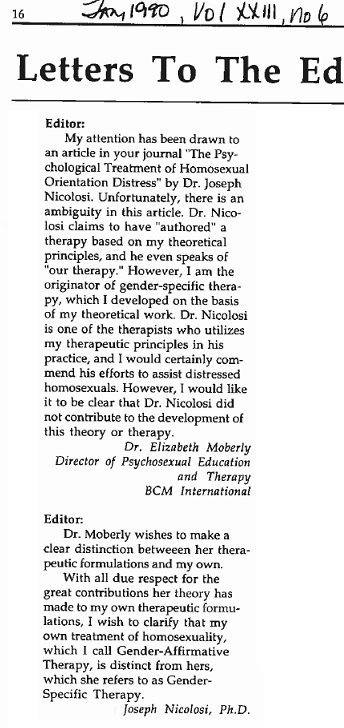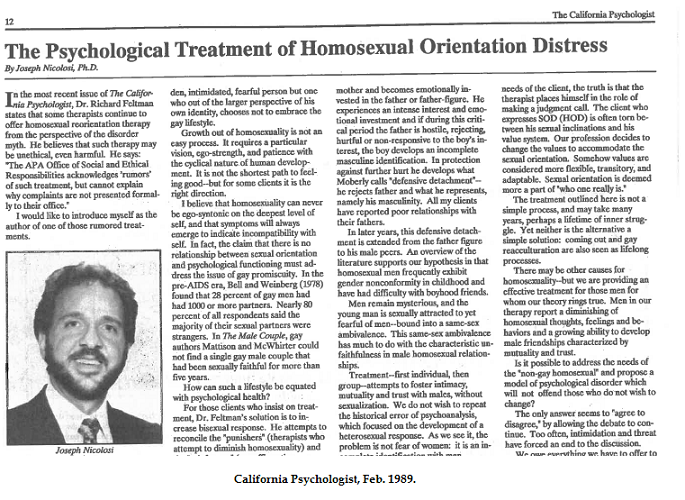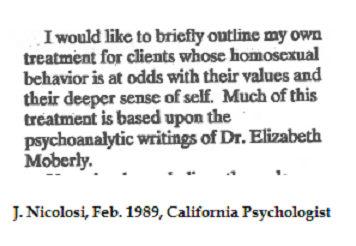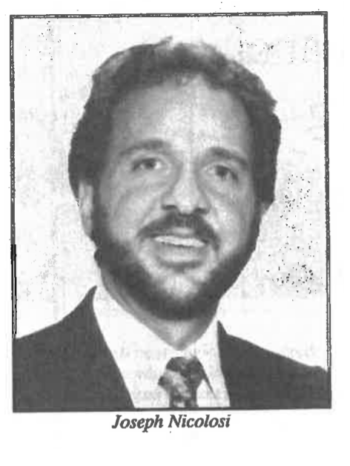Recently, Amazon stopped offering Joseph Nicolosi’s books for sale. Nicolosi, who died in 2017, was a polarizing figure in American psychology but was well liked among evangelicals. Evangelicals are writing about reparative therapy now like it was Christian counseling. I know they know it wasn’t but that is a subject for another post.
In this post, I want to publish an adaptation of two 2017 articles (here and here) in which I disclosed a rift in the reparative therapy movement between 1990 and 1996. There was a dispute over who originated the form of therapy later popularized as reparative therapy. This post lays out that dispute. If Elizabeth Moberly had her way in the early days, Nicolosi’s books might have been pulled because she believed they contained too much of her material without sufficient attribution. The ex-gay movement in the form of Exodus International sided with Nicolosi and the rest is history.
The following is adapted from posts which were originally published on January 19 & 20, 2017.
Elizabeth Moberly Accused Joseph Nicolosi of Taking Her Work
Once upon a time, I wrote frequently about sexual orientation, psychotherapy, and the culture wars that have raged about those topics. A review of my blog posts since I started in 2005 would be like reading a history of the ex-gay movement, reparative therapy, sexual orientation change efforts and many related matters. Even though general interest has diminished about gay change efforts since the close of Exodus International, I have some stories still to explore.
Below is a brief letter to the editor exchange between Elizabeth Moberly and Joseph Nicolosi. While I don’t have permission to publish them, I also have some letters involving Dr. Moberly and the Exodus International board which reveals a six-year feud (1990-1996) between Moberly and Nicolosi over who founded reparative therapy. Moberly strongly asserted that Joe Nicolosi plagiarized portions of her work and took credit for the development of reparative therapy which she believed rightly belonged to her.
First, here is the letters to the editor of the California Psychologist (Jan, 1990).

Thanks to the help of California Psychological Association administrator Patricia VanWoerkom, I was able to get Nicolosi article. An image of part of it is below. To read the entire article, click here.

In the article, Nicolosi says:

In the piece, he provided the standard reparative explanation of homosexuality. According to this view, gays do not fully identify with the same sex parent. This gives rise to a defensive detachment which they seek to repair with same sex relationships. He gave credit to Moberly for her writings but this was not enough for her. In her pleas to the Exodus International board, Moberly claimed that Nicolosi was merely a practitioner of her reparative therapy approach. She felt Nicolosi’s article wasn’t just based on her theoretical writings, but that his entire approach was simply borrowed from her. From her point of view, he was not a developer or collaborator, but someone who simply copied what she had already discovered.
Moberly pointed out to the Exodus board that Nicolosi said he was the “author of one of those rumored treatments [to help gays change to straight].” Moberly countered that Nicolosi did not author anything. He simply copied what she had written and passed some of it off as his own work.
Ethics Complaint
According to Moberly, she filed an ethics complaint with the American Psychological Association and California Psychological Association. Only the CPA responded, she claimed, and found that Nicolosi had inadvertently copied her material. A CPA representative later told me that those records were sealed.
I think the founding of modern day reparative therapy is an interesting historical issue. Some time ago, I asked a former Exodus board member (who wants to remain anonymous) about the rift. The individual said the dispute was “common knowledge” among Exodus people. My source said
Elizabeth believed that Joe’s reparative therapy concept belonged to her as reported in her research work in Psychogenesis and Homosexuality: A New Christian Ethic, and that Joe had not given sufficient acknowledgment to her work; and (2) that Joe believed he had referenced her work adequately and had taken her concepts and built upon them sufficiently to justify reporting on his own work in his book Reparative Therapy.
This individual was on the Exodus board at the time and made contacts with both Nicolosi and Moberly to try to resolve their differences. According to my source, the effort was unsuccessful. Nicolosi and Moberly did not come to unity over the issues. In 1996, Moberly left the ex-gay movement to return to England to conduct research into alternative treatments for AIDS and cancer. I tried to contact her in 2011 but received no reply.
Moberly’s books on reparative therapy were published in the early 1980s. According to Moberly, Nicolosi was introduced to her work via a client and he began using her approach in the late 1980s. Moberly was exasperated that Nicolosi published his first book on the subject in 1991 without giving her what she felt was sufficient credit. In his 1991 book, Nicolosi did in fact cite one of Moberly’s books and gave her credit for the concept of defensive detachment. However, Moberly felt that was insufficient. She pulled out of speaking for at least one of the Exodus conferences because she believed Exodus should not have promoted Nicolosi’s book. Perhaps she would have written Amazon if it existed in 1991.
As to the specific question — who conceptually founded reparative therapy? — I think the answer must be Elizabeth Moberly. She wrote first about all of the key concepts and described the kind of therapeutic relationship that reparative therapists, including Nicolosi, have promoted. Without question, Nicolosi popularized reparative therapy through his books, the organization he co-founded (NARTH), and via the vocal support of Exodus International and Focus on the Family. His appearances with James Dobson on the Focus on the Family radio show and subsequent role as featured speaker at FoF’s Love Won Out conferences solidified Nicolosi’s enduring role as key representative of reparative therapy. The reason his books are now being targeted is because he was the central figure in promoting the approach.
In the current scene, it doesn’t much matter who developed the concepts. People who oppose the books just want them gone. There is a certain irony that long ago the founder of reparative therapy also tried to prevent their promotion.
